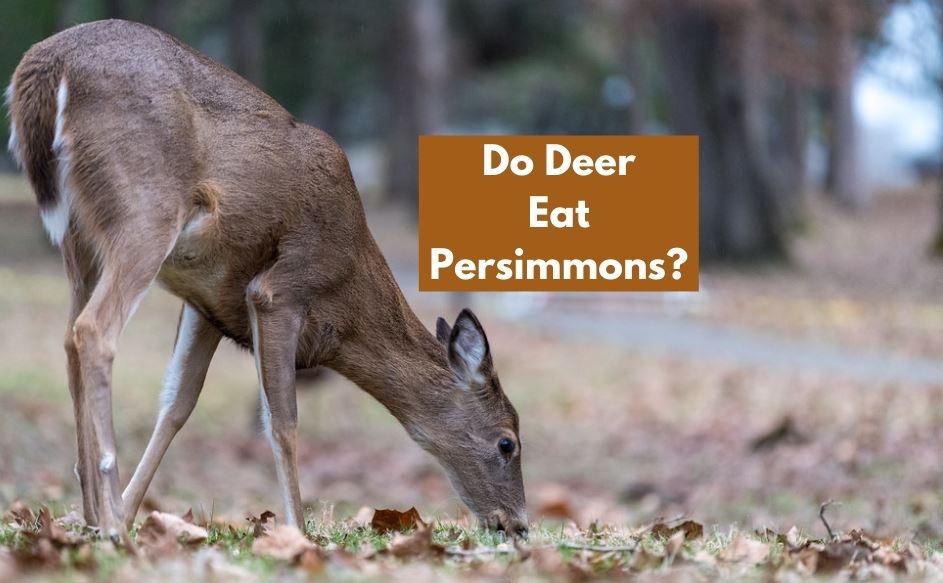There are a lot of myths out there about what deer do and do not eat, especially when it comes to common flowers and plants. One common question is: do deer eat persimmons?
Yes, deer love to eat persimmons. They will eat the persimmon fruit, twigs, leaves, and full young persimmon trees. Deer are attracted to persimmons because of their sweet taste.
Considering that a single deer can eat up to ten pounds of plants each day, you can see how deer eating persimmons can do some serious damage to these trees!
Why Do Deer Eat Persimmons?
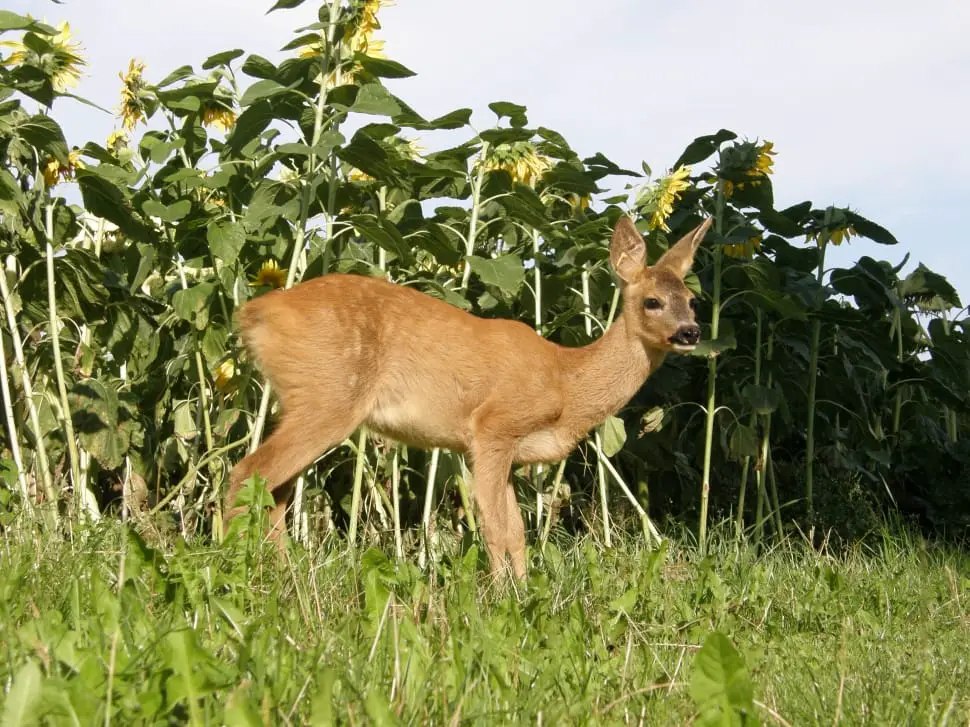
As we covered, deer have been known to eat the entire persimmon tree (leaves, buds, fruit, twigs, and all).
But why do they do this?
Deer like sweet foods and leafy green browse, and persimmon trees check every box.
Deer can do some serious damage to a large number of persimmons in a single sitting if they’re hungry enough!
This was confirmed in a 1999 study on deer plant-eating habits by Cornell University.
Plants like persimmons contain water, sugar, carbohydrates, and nutrients, which makes them an ideal food source for deer.
And don’t think that newer persimmon trees are safe either: deer actually prefer new growth because they’re more tender.
Additionally, deer will consume a wide variety of foods like persimmons based on opportunity.
They’re planted in the ground and grow easily in many areas, so they’re easy for deer to access.
In fact, persimmons are increasing in popularity for hunters who want a deer food plot but don’t have access to farming equipment.
This is because persimmon trees are relatively easy to grow and attract deer so well.
Check out this trail cam video of deer chowing down on some persimmons:
If you’re not convinced, leave some persimmons out or plant some, and wait to see what happens!
When Do Deer Eat Persimmons?
Deer hit persimmon trees most often during late fall because these trees ripen in October.
Persimmons do not need to be exposed to a frost to be ready to eat, so you may see deer hitting the persimmons in your area a little early depending on what other foods are available.
Once the fruit falls, deer will continue to browse the leaves and twigs of persimmon trees throughout the year.
Using Persimmon Trees On Deer Food Plots
You can plant persimmon trees purposely to attract deer as part of a food plot and will almost certainly see success in this strategy!
Ideally the deer in your area will already be used to having persimmons in their diet.
If not, hold off on introducing a new food like persimmons hay because it can interrupt their normal food search patterns and make them completely reliant on persimmon trees as their new winter food source.
You can grow persimmon trees best in zones 4-9, but be aware that only the female persimmon tree bears fruit!
How Do I Keep Deer From Eating My Persimmon Trees?
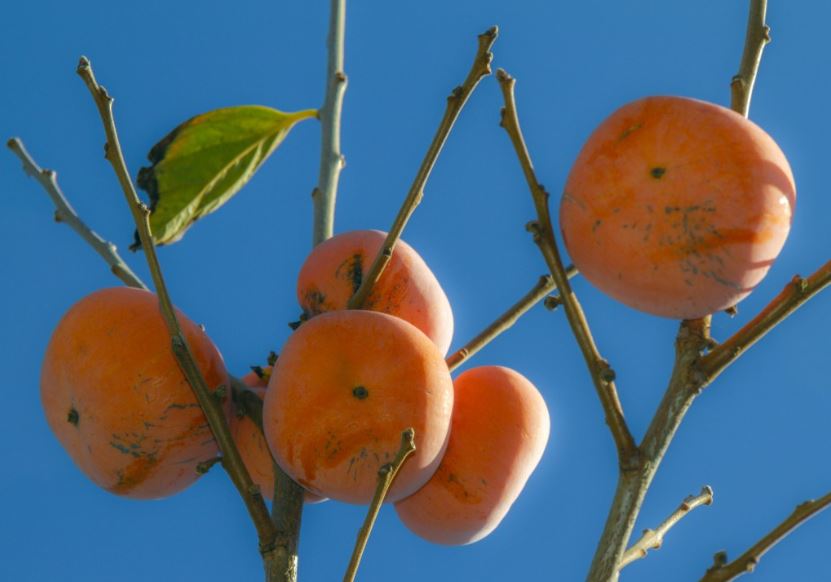
Most farmers and hunters encourage deer to browse their persimmons as part of food plots or other attractants.
If you’re in the other camp and want to protect your persimmons from deer, we’ve got some great options for you.
There are a few things to keep in mind when you’re protecting persimmon trees from hungry deer: their habits, your scent, repellent options, and when you plant them.
Deer will eat nearly anything if they’re hungry enough, so your main goal is making your garden as least inviting to deer as possible.
Check out our guide on how to keep deer from eating plants where we cover 25 quick and easy tips for keeping hungry deer out of your garden.
Will Persimmon Trees Grow Back After Deer Eat Them?
Fortunately, most trees can heal after a good bit of deer damage.
You’ll want to trim off any loose or shredded bark where it’s not tightly secured to the trunk.
Cut any wounds on the tree into a football shape which will help the tree heal faster.
Prune back any damaged limbs, and take preventative measures to keep the deer from damaging them in the future.
Are Persimmons Good For Deer?
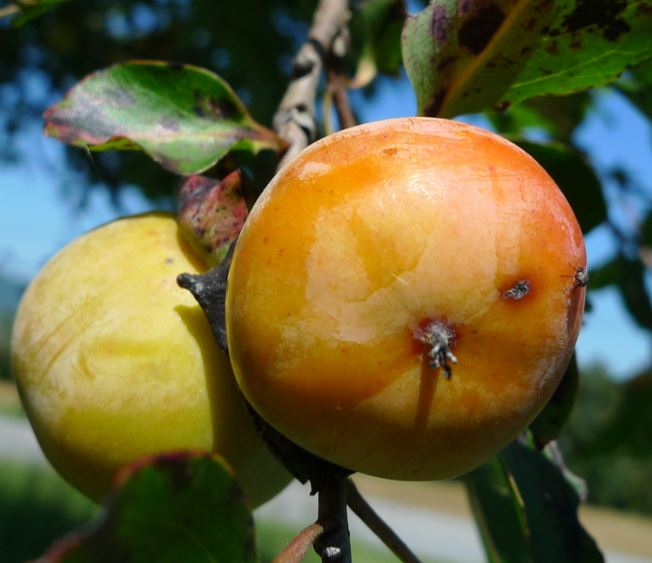
Persimmons have small amounts of fiber and a good amount of sweet carbohydrates, so they attract deer easily.
In addition to being a great source of energy, deer eating persimmons provide them with the following vitamins and minerals:
- Vitamins A, B6, C, E, and K
- Potassium
- Copper
- Manganese
These vitamins and minerals provide deer with many benefits.
For example, vitamin C will help protect deer against scurvy, and vitamin assists in deer immune system function.
Manganese assists deer in growth, respiration, and reproduction.
Fat-Soluble Vitamins in Persimmons For Deer
Vitamins A and calcium are fat-soluble, so they can be stored in the deer’s fat and liver to be used later as needed.
This means that vitamin A content from deer-eating persimmons can be “stored up” for later use, which is highly beneficial.
Water-Soluble Vitamins In Persimmons For Deer
Vitamin C, B Vitamins, phosphorus, zinc, and potassium are all water-soluble, which means they cannot be stored, so they must be replaced continually.
So a deer that eats persimmons for the vitamin C content must continue to consume foods that contain these necessary vitamins to stay healthy.
How To Feed Deer Persimmons
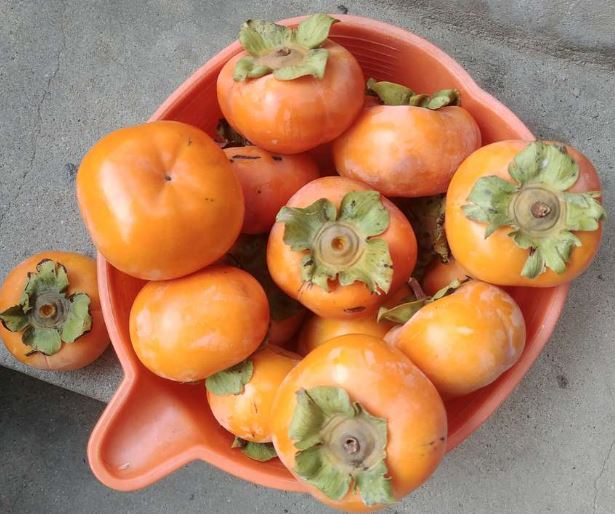
Most people who ask if deer like persimmons are concerned with keeping deer away from them.
If you are trying to feed deer persimmons in your backyard and attract them, then this next section of our guide is for you.
There are a few things to keep in mind when feeding deer persimmons: the size of the portion, your scent, and how many deer you’re feeding.
Make sure to place the persimmons on the ground where they’re visible and can be easily reached by deer.
If deer are not normally around your area in winter, don’t feed them leading up to winter as they will not migrate where and when they should.
This will lead to the deer relying on you as their food source and can result in starvation.
Should I Cut Persimmons For Deer To Eat?
Chances are that it’s not worth it for you to cut persimmons for deer.
You could leave your scent on them, plus the deer’s teeth are designed to be able to eat food that’s best for them.
Persimmons are naturally soft, so it’s not necessary to cut them up for feeding to deer.
Don’t Leave Your Scent On Deer Food
Deer have a keen sense of smell that allows them to smell human scent farther than bloodhounds can, and can smell up to six different scents at once.
Deer won’t eat food like persimmons if they have a strong human scent on them, so you should take care to minimize your trace.
You can do this by rinsing the persimmons and also washing your hands with antimicrobial soap.
Alternatively, you can put a few drops of apple cider vinegar on your hands when handling the food you’ll be giving to the deer.
Another easy option is to use gloves when handling persimmons for deer to eat.
Consider The Amount Of Deer You’re Feeding
If you have lots of deer in your area, think twice about putting out food continuously for them.
If you bring deer together at the same feeding site, it can increase their risk of contracting the chronic wasting disease or other communicable diseases from each other.
Do Deer Eat Persimmons? Wrapping Things Up
So, do deer eat persimmons?
The answer is yes!
Deer will eat all parts of the persimmon tree whenever they can, especially when the trees are tender and young.
Persimmon trees are a great way to attract deer and a wise addition to any food plot or hunting area.
If you’re trying to protect your persimmons, there are many steps you can take which we’ve outlined above in this guide.
Have any observations to add to the discussion? Be sure to let us know in the comments below.
Check our our other helpful wildlife guides while you’re here:
- Do deer eat rutabaga?
- Do deer eat buckwheat?
- Do deer eat white pine?
- Do deer eat honeysuckle?
- Do deer eat oats?
- Do deer eat sorghum?
- Do deer eat milo?
- Do deer eat ryegrass?
- Do deer eat corn?
- Do deer eat rice?
- Do deer eat sweet potatoes?
- Do deer eat elderberry?
- Do deer eat mulberry trees?
- Do deer eat hedge apples?
- Can deer eat lemons?

